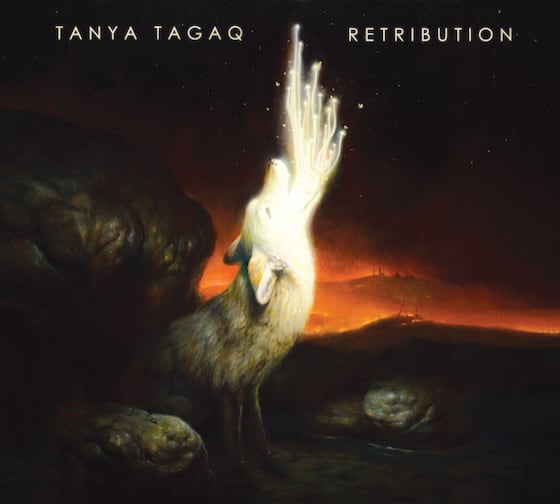Tanya Tagaq is one of those artists of whom it is said "You have to go see her live," as if the recorded artefact simply won't convey what goes on at her show. And maybe it won't — the last time I saw the Inuk throat singer perform, she guided hundreds of people at Nathan Phillips Square in a song that felt, to me, like a sympathetic orgasm (her music can be quite open to interpretation).
On her fourth album, Retribution — perhaps even more so than on her Polaris Prize-winning 2014 album Animism — Tagaq achieves an experience as potent as, and analogous to, her live show: Retribution is immersive, cathartic, potentially even transformative. And while on Animism some of Tagaq's political beliefs were implied (and in the case of "Fracking," frightfully clear), this time around she's taken things farther and deeper, made her outspoken messages more outspoken, more crystal clear.
The record is called Retribution, and its screechy, panicked, eight-minute-long freakout of a title track may initially seem to have been devised to punish the neighbours. ("The retribution will be swift," Tagaq says.) But it's deliverance, not just punishment, that Tagaq offers; from our modern life of money and greed and isolation and possessions and oil obsession, and so on.
Retribution feels even more collaborative than its predecessor; Tagaq has deepened her ties with producer/violinist/sound-finder Jesse Zubot and drummer Jean Martin (both wonderful and integral to the intensification of her sound) and brought in Christine Duncan and the Element Choir (they sound at one point exactly like my pissed off 16-year-old cat), Inuk singer Ruben Komangapik, Tuvan throat singer Radik Tyulyush, former q host Shad (rapping on "Centre" and proving yet again that political songs can be uplifting); even her daughter Inuuja features, on the opening track, "Ajaaja."
But the guiding force, as always, is Tagaq, whose throat singing, groans, screams and words bring us closer to what is vital — in songs like "Aorta," about the mortal struggle to just keep the blood pumping, to stay alive; "Nacreous" (meaning iridescent), in which Tagaq sounds a bit like Golem; in "Cold," where Tagaq delivers matter-of-factly a kitchen sink-like recipe for melting ice to make a devastatingly clear point about the peril that earth and humanity are in due to global warming.
Tagaq's music is rarely "easy," but it's actually the album's quiet ending that proves the most unsettling. It takes a while for it to sink in that it's Nirvana's "Rape Me" that Tagaq, who attended a residential school, is singing, because her delivery of his melody is so gentle and slow, totally devoid of his angst and anger (in fact it sounds vulnerable and loving). "I'm not the only one," she repeats, and the full impact of Cobain's lyrics finally comes into view.
(Six Shooter)On her fourth album, Retribution — perhaps even more so than on her Polaris Prize-winning 2014 album Animism — Tagaq achieves an experience as potent as, and analogous to, her live show: Retribution is immersive, cathartic, potentially even transformative. And while on Animism some of Tagaq's political beliefs were implied (and in the case of "Fracking," frightfully clear), this time around she's taken things farther and deeper, made her outspoken messages more outspoken, more crystal clear.
The record is called Retribution, and its screechy, panicked, eight-minute-long freakout of a title track may initially seem to have been devised to punish the neighbours. ("The retribution will be swift," Tagaq says.) But it's deliverance, not just punishment, that Tagaq offers; from our modern life of money and greed and isolation and possessions and oil obsession, and so on.
Retribution feels even more collaborative than its predecessor; Tagaq has deepened her ties with producer/violinist/sound-finder Jesse Zubot and drummer Jean Martin (both wonderful and integral to the intensification of her sound) and brought in Christine Duncan and the Element Choir (they sound at one point exactly like my pissed off 16-year-old cat), Inuk singer Ruben Komangapik, Tuvan throat singer Radik Tyulyush, former q host Shad (rapping on "Centre" and proving yet again that political songs can be uplifting); even her daughter Inuuja features, on the opening track, "Ajaaja."
But the guiding force, as always, is Tagaq, whose throat singing, groans, screams and words bring us closer to what is vital — in songs like "Aorta," about the mortal struggle to just keep the blood pumping, to stay alive; "Nacreous" (meaning iridescent), in which Tagaq sounds a bit like Golem; in "Cold," where Tagaq delivers matter-of-factly a kitchen sink-like recipe for melting ice to make a devastatingly clear point about the peril that earth and humanity are in due to global warming.
Tagaq's music is rarely "easy," but it's actually the album's quiet ending that proves the most unsettling. It takes a while for it to sink in that it's Nirvana's "Rape Me" that Tagaq, who attended a residential school, is singing, because her delivery of his melody is so gentle and slow, totally devoid of his angst and anger (in fact it sounds vulnerable and loving). "I'm not the only one," she repeats, and the full impact of Cobain's lyrics finally comes into view.
